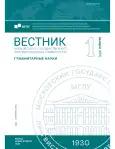“Successful Woman” in Russia versus “Successful Woman”in China
- Authors: Rarenko A.1
-
Affiliations:
- Institute of Scientific Information for Social Sciences (INION) of the Russian Academy of Sciences
- Issue: No 1(895) (2025)
- Pages: 149-154
- Section: Cultural studies
- URL: https://journal-vniispk.ru/2542-2197/article/view/279203
- ID: 279203
Cite item
Full Text
Abstract
The article examines the category of “successful woman” based on the comparative material of modern Russian and Chinese linguistic cultures. The purpose of the study is to find out how the concept of “successfulness” is implemented in the Russian and Chinese linguistic cultures, in particular, such its fragment as “successful woman”. The material for writing the article was the work of domestic and foreign researchers in the field of axiology, sociology, social psychology, sociolinguistics, cultural studies and linguoculturology as well as the research of the author of the article. The article confirms the hypothesis that the characteristics of “successful woman” are not permanent and depend on the characteristics of the national cultural development of a particular ethnic group.
Keywords
About the authors
Andrey Rarenko
Institute of Scientific Information for Social Sciences (INION) of the Russian Academy of Sciences
Author for correspondence.
Email: andrejj1997@rambler.ru
Russian Federation
References
- Hofstede, G. (2001). Culture’s Consequences: Comparing Values, Behaviors, Institutions, and Organizations across Nations. Thousand Oaks, CA: Sage.
- Hofstede, G. (2014). Model’ Hofstede v kontekste: parametry kolichestvennoj harakteristiki kul’tur = The Hofstede model in the context: parameters of quantitative characteristics of cultures. Transl. from English V. B. Kashkin. Jazyk, kommunikacija i social’naja sreda, 12, 9–49. (In Russ.)
- Minkov, M., Sokolov, B., Lomakin, I. (2023). Jevoljucija modeli kul’turnyh izmerenij Hofstede: paralleli mezhdu ob#ektivnoj i sub#ektivnoj kul’turoj = Globalism and new values: What is the concept of value and whether there are new values. In Sociologicheskoe obozrenie, 22(3), 287–317. (In Russ.)
- Naumenko, T. V., Morozova, D. A. (2018). Teorija mezhkul’turnyh izmerenij G. Hofstede kak metodologicheskaja osnova issledovanija sovremennyh social’nyh processov = The theory of intercultural dimensions by G. Hofstede as a methodological basis for the study of modern social processes. In Mezhdunarodnyj zhurnal issledovanij kul’tur, 1, 144–154. (In Russ.)
- Minasjan, L. A. (2018). Globalizm i novye cennosti: Chto est’ ponjatie cennosti i sushhestvujut li novye cennosti = Globalism and new values: What is the concept of value and whether there are new values. In Al’ternativnye modeli globalizacii i problemy sovremennoj global’noj dinamiki (pp. 156–162). Rostov-on-Don. (In Russ.)
- Lapin, N. I., Beljaeva, L. A. (Eds.). (1996). Dinamika cennostej naselenija reformiruemoj Rossii = Dynamics of values of the population of reformed Russia. Moscow: RAN. Institut filosofii. (In Russ.)
- Latova, N. V. (2016). Kul’turnaja specifika rossijan (jetnometricheskij analiz na osnove koncepcii G. Hofstede) = Cultural specificity of Russians (ethnometric analysis based on the concept of G. Hofstede). Vestnik Instituta sociologii, 7(4), 155–179. (In Russ.)
- Shvarc, Sh. (2008). Kul’turnye cennostnye orientacii: priroda i sledstvija nacional’nyh razlichij = Cultural value orientations: the nature and consequences of national differences. Transl. from English by E. A. Valueva. In Psihologija. Zhurnal Vysshej shkoly jekonomiki, 5(2), 37–67. (In Russ.)
- Akaliyski, P., Minkov, M., Li, J., Bond, M. H., Gehrig, S. (2022). The Weight of Culture: Societal Individualism and Flexibility Explain Large Global Variations in Obesity. In Social Science & Medicine, 307, 115–167.
- Beugelsdijk, S., Welzel, C. (2018). Dimensions and Dynamics of National Culture: Synthesizing Hofstede with Inglehart. In Journal of Cross-Cultural Psychology, 49(10), 1469–1505.
- Danilevskaja, N. V., Hu, S. (2014). Russkaja i kitajskaja “uspeshnaja zhenshhina”: vosprijatie i tolkovanie sovremennikami = Russian and Chinese “successful woman”: perception and interpretation by contemporaries. In Vestnik Permskogo universiteta. Rossijskaja i zarubezhnaja filologija, 3(27), 42–53. (In Russ.)
- Utrobina, M. A., Baranova V. A. (2018). Obraz uspeshnoj zhenshhiny v sovremennyh zhenskih gljancevyh zhurnalah = The image of a successful woman in modern women’s glossy magazines. In Shaboltas, A. V., Gurieva, S. D. (Eds.), Psihologija XXI veka: Psihologija kak nauka, iskusstvo i prizvanie (pp. 208–215): collection of papers of the International Scientific Conference of Young Researchers; in 2 vols. (In Russ.)
- Kharitonova, O. V. (2017). Rol’ zhenskih zhurnalov v formirovanii koncepta “uspeshnaja zhenshhina” = The role of women’s magazines in the formation of the concept of “successful woman.” In Avdeeva, I. N. (Ed.), Jazyk i lichnost’ v polikul’turnom prostranstve (pp. 219–223): collection of papers. Moscow. (In Russ.)
- Hu, S. (2013). Rechevoe voploshhenie koncepta “uspeshnaja zhenshhina” v tekstah gljancevyh zhurnalov (na fone kitajskogo jazyka) = The speech embodiment of the concept of “successful woman” in the texts of glossy magazines (against the background of the Chinese language): PhD in Philology. Perm. (In Russ.)
- Rarenko, A. A. (2020). On the lexical meaning of the notion “success” (basing on Russian explanatory and terminology dictionaries). Social Sciences and Humanities. Domestic and Foreign Literature. Series 11: Sociology, 2, 9–12. (In Russ.)
- Azhgihina, N. I. (1997). “Zheleznaja ledi” ili Baba Jaga? “Zhenskaja tema” v sovremennoj rossijskoj presse = “The Iron Lady” or Baba Yaga? “Women’s theme” in the modern Russian press. In Materialy Pervoj Rossijskoj letnej shkoly po zhenskim i gendernym issledovanijam “Valdaj 96” (pp. 43–46). Moscow. (In Russ.)
Supplementary files










